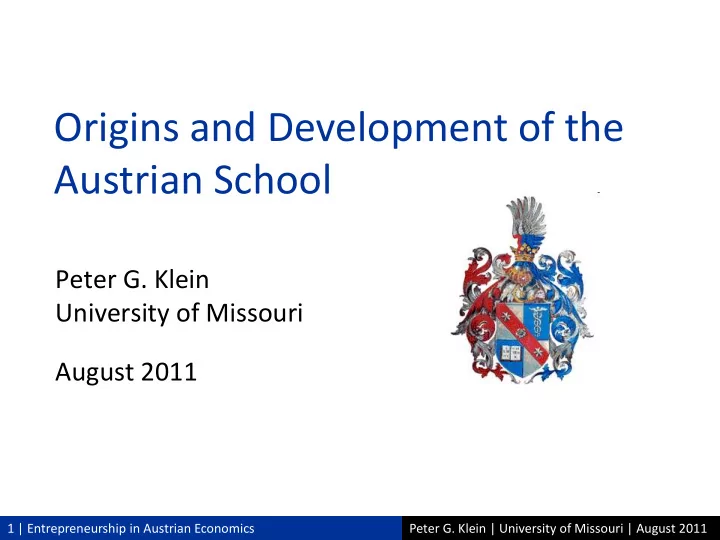

Origins and Development of the Austrian School Peter G. Klein University of Missouri August 2011 1 | Production and the Firm 1 | Entrepreneurship in Austrian Economics Peter G. Klein | University of Missouri | August 2011 Peter G. Klein | Mises University 2011
Main figures in entrepreneurship theory ► Israel Kirzner ► Joseph Schumpeter ► Frank Knight 2 | Production and the Firm 2 | Entrepreneurship in Austrian Economics Peter G. Klein | University of Missouri | August 2011 Peter G. Klein | Mises University 2011
Carl Menger (1840-1921) and the birth of a tradition ► Causal-realistic analysis of price formation ► Emphasis on subjective value, marginal decision- making, and distributed knowledge ► Entrepreneur as a coordinating agent “Entrepreneurial activity includes: (a) obtaining information about the economic situation; (b) economic calculation — all the various computations that must be made if a production process is to be efficient (provided that it is economic in other respects); (c) the act of will by which goods of higher order (or goods in general — under conditions of developed commerce, where any economic good can be exchanged for any other) are assigned to a particular production process; and finally (d) supervision of the execution of the production plan so that it may be carried through as economically as possible.” Importance of uncertainty and knowledge Entrepreneur as resource owner 3 | Entrepreneurship in Austrian Economics 3 | Production and the Firm Peter G. Klein | University of Missouri | August 2011 Peter G. Klein | Mises University 2011
Böhm-Bawerk and Mises ► Eugen von Böhm-Bawerk (1851-1914) Capital as a complex, interconnected structure Influence as a public figure and teacher ► Ludwig von Mises (1881-1973) Monetary theory and critique of socialism Entrepreneurship ► Monetary calculation as the entrepreneur’s primary tool ► Profit as a residual resulting from uncertainty (cf. Knight) The pure entrepreneur versus the “promoter” ► Economics “also calls entrepreneurs those who are especially eager to profit from adjusting production to the expected changes in conditions, those who have more initiative, more venturesomeness, and a quicker eye than the crowd, the pushing and promoting pioneers of economic improvement” (Mises, 1949, p. 255) – foreshadows Kirznerian “alertness.” 4 | Entrepreneurship in Austrian Economics 4 | Production and the Firm Peter G. Klein | University of Missouri | August 2011 Peter G. Klein | Mises University 2011
Wieser and Hayek ► Friedrich von Wieser (1851-1926) General, all-encompassing definition of the entrepreneur: owner, manager, leader, innovator, organizer, speculator Notes that the entrepreneur “must possess the quick perception that seizes new terms in current transactions as his affairs develop” -- first hint of alertness as an entrepreneurial attribute ► F. A. Hayek (1899-1992) No specific theory of the entrepreneur, but elaborates background conditions of dispersed, tacit knowledge (Hayek 1937, 1945) and competition as a “discovery procedure” (Hayek 1948, 1968) Competition “is important primarily as a discovery procedure whereby entrepreneurs constantly search for unexploited opportunities that can also be taken advantage of by others. . . . This “ability to detect certain conditions . . . can *be used+ effectively only when the market tells them what kinds of goods and services are demanded, and how urgently“ (Hayek, 1968). 5 | Entrepreneurship in Austrian Economics 5 | Production and the Firm Peter G. Klein | University of Missouri | August 2011 Peter G. Klein | Mises University 2011
Recommend
More recommend